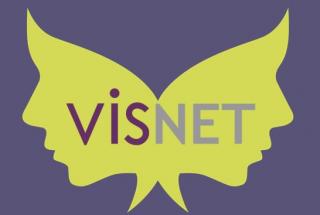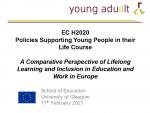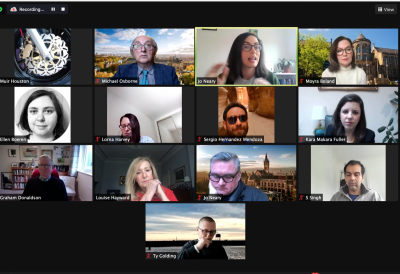Dr Muir Houston, Deputy Director of CR&DALL opened the webinar and provided an overview of logistics for the 80+ delegates and panellists. Professor Ellen Boeren, Deputy Director of Research in the School of Education, began formal proceedings, explaining that adult learning and youth transition is a core and important theme of the School.
All of the projects presenting have an investigator who is a core member of the Centre for Research and Development in Adult and Lifelong Learning, whose website she recommended visiting (http://cradall.org).
Virtual In Situ Networking to reinvent the rules of international collaborations and reduce gender differences in academic careers (VisNET)
 Prof. Catherine Lido presented the work of the EPSRC-funded Inclusion matters project VisNET on behalf of the team at Glasgow, Edinburgh and Strathclyde universities. Catherine introduced the work, which aims to address gendered inequalities in academic STEM, namely by addressing strategic networking and international collaboration with online tools and support.
Prof. Catherine Lido presented the work of the EPSRC-funded Inclusion matters project VisNET on behalf of the team at Glasgow, Edinburgh and Strathclyde universities. Catherine introduced the work, which aims to address gendered inequalities in academic STEM, namely by addressing strategic networking and international collaboration with online tools and support.
The talk began with a discussion of the central role of networking in academic success and promotion, proceeding to the project's e-interventions, and discussion of mixed-methods findings on the implicit and explicit barriers identified, as well as facilitators of network growth using Social Network Analysis of their mapped professional network. The talk including with practical priorities for improving digital footprints, increasing effective online networking and the deployment of collaborative tools, as well as mentoring and CPD training for more explicit approaches to strategic network growth amongst early-career women in academic STEM.
Can dual apprenticeships create better and more equitable social and economic outcomes for young people? A comparative study of India and Mexico
 Drs. Srabani Maitra and Judith Jacovkis presented their research on Dual Apprenticeships in India and Mexico funded by the UK’s Economic and Social Research Council (ESRC) within the Global Challenges Research Fund (GCRF).
Drs. Srabani Maitra and Judith Jacovkis presented their research on Dual Apprenticeships in India and Mexico funded by the UK’s Economic and Social Research Council (ESRC) within the Global Challenges Research Fund (GCRF).
This international and interdisciplinary project is led by Dr Oscar Valiente from the School of Education and is a collaboration between the University of Glasgow, Technological Institute of Monterrey Mexico City (Mexico), Indian Institute of Management Calcutta (India), University of Zurich and the University of Cologne.
The project aims to understand why and how lower- and middle-income countries like India and Mexico adopt the Germanic model of Dual Apprenticeships. In the webinar, Srabani and Judith gave an overview of the project, highlighting how the study develops a comprehensive research approach that scrutinizes the different, but mutually constitutive stages of policy transfer, from the adoption and recontextualization of dual apprenticeships in national programmes to their implementation and impact on social inequalities in multiple local contexts.
Through in-depth interviews with policymakers, employers, unions, teachers and young students enrolled in Dual Apprenticeship training in India and Mexico, the project seeks to raise awareness in the following areas a) increased involvement of employers in vocational training programmes; b) greater alignment between training and industry requirements; and c) increased employment opportunities for young people in vocational education, especially those coming from marginalised backgrounds.
The presentation was also attended by Ms Soma Mitra Mukherjee, Deputy Director of the Bengal Chamber of Commerce and Industries (India) who emphasised the significance of the project and its contribution to the understanding of the skill ecosystem as well as associated challenges of skill mismatch and youth unemployment in India and globally.

 Presentations from Dual Apprenticeship in India and Mexico
Presentations from Dual Apprenticeship in India and Mexico
Policies supporting young Adults in their life course. A Comparative Perspective of Lifelong Learning and Inclusion in Education and Work in Europe
 Against the background of high fragmentation and persistent weakness and ineffectiveness of adult education policies across Europe, Dr Oscar Valiente explained that the project, Policies supporting young Adults in their life course. A Comparative Perspective of Lifelong Learning and Inclusion in Education and Work in Europe” (YOUNG_ADULLLT) funded by the European Commission with the H2020 research programme set out to enquire into the specific forms of embedding of these policies in the regional economy, the labour market, the education/training systems and the individual life projects of young adults.
Against the background of high fragmentation and persistent weakness and ineffectiveness of adult education policies across Europe, Dr Oscar Valiente explained that the project, Policies supporting young Adults in their life course. A Comparative Perspective of Lifelong Learning and Inclusion in Education and Work in Europe” (YOUNG_ADULLLT) funded by the European Commission with the H2020 research programme set out to enquire into the specific forms of embedding of these policies in the regional economy, the labour market, the education/training systems and the individual life projects of young adults.
At the focus of attention of the project has been lifelong learning policies aimed at creating economic growth and, at the same time, guaranteeing social inclusion through targeting young adults in vulnerable situations, for instance, those not in education or training (NEETs) or those in situations of near social exclusion. The international comparative project starts at this point by focusing on the various lifelong learning policies (LLL) for young adults and analysing their potentially competing (and possibly ambivalent) orientations and objectives.
The objective was to yield insights into their implications as well as intended and unintended effects on young adult life courses. YOUNG_ADULLLT aimed at critically analysing current developments of LLL policies in Europe in order to prevent ill-fitted policies from further exacerbating existing imbalances and disparities as well as at identifying best practices and patterns of coordinating policy-making at the local/regional level.
 Presentation from YOUNG_ADULLLT
Presentation from YOUNG_ADULLLT
To view a recording of the Webinar, click this link or the image below [pending]:

Response Panel
There followed some initial responses from a panel of collaborators and beneficiaries.
Dr Katie Nicoll Banes from eBase, Edinburgh, argued that the establishment of networks with business is highly relevant for research, echoed what Prof. Lido had presented. She suggested that the current pandemic could represent an opportunity and not simply a disaster, and cannot be used as a reason to prevent future progress. Crises can drive change and they have seen such opportunities through rapid response calls for funding bids as a prime opportunity to increase diversity.
Soma Mitra Mukherjee presented the massive demand for skilled human resources in the manufacturing sector in India. She reported the convergence between academia and industry has been crucial in recent years in India, where the Chamber of Commerce has played a determinant role in policy advocacy. She highlighted the importance of policy implementation as part of research efforts in India.
Questions and Answers
Can you please explain a bit more about the role of peer mentoring (in the VisNet project), not just in terms of collaboration, but maybe also another area like learning or research, for example
Dr Catherine Lido replied that the team has started a paper on mentoring. She said that they have created small mentor groups and it has been an interesting aspect of the work. Referring to higher education transitions she indicated that people need to know why they are making these transitions because it is not clear that transitional and well-being support actually leads to achievement. There needs to be very clear expectations about what mentoring is and what to expect from it.
I wonder whether the study focused on specific populations in Mexico and India like very urban citizens and where is actually the voice of the indigenous people?
Dr Maitra said that in both countries young people that they were interviewing are from vocational education institutions and typically come from very marginalized backgrounds. In India, the students are from very, very marginalized backgrounds. There are more young men than women so gender definitely is an issue, that’s why they are trying to incorporate as many women as possible amongst their interviewees. In Mexico also, young people come from marginalized backgrounds and some are indigenous. She indicated, however, that the representation of indigenous students overall is quite low they are being included as much as possible in interviews. Dr Jacovkis also referred to the question by mentioning that the population in both countries is basically urban and don't move a lot to enrol in their studies. She confirmed that in both countries, most students are from low socio-economic backgrounds.
According to your second main finding of your project, does this mean that some LLL policies kind of trying to blame individuals' failures or problems for their own innate abilities or deficient rather than considering the structural disability?
Dr Valiente replied that for example we are very good at creating policy discourses policy documents and new government initiatives but we often find a mismatch in the diagnosed solution. For example, in a policy document from the Scottish Government there were two main problems: on one hand a group of young students struggling with employment because of the context of crisis, and on the other hand, a group of young people that have always been socially excluded. The policy solution was to develop skills for employability, but this was a mismatch with what had been diagnosed.
Where do you see this research project influencing future institutional decisions and actions?
Professor Lido indicated that this was a pertinent question since the pandemic also offers us the opportunity to change. It could be an opportunity to revert to stereotypes and learned ways of working. She referred to the importance, for example, of a recent announcement by the Vice-Chancellor of the University of Glasgow, acknowledging the inequitable treatment of BAME staff and students, and of the work that VisNet has been doing to combat inequality. She referred to an article from the project in Nature Index that provides 14 things that could fix gender inequality in HE. She concluded by saying that often we see the solutions to racism, discrimination and inequality at the individual level because it's much harder to change structures.
Can you say something about the challenges of policy borrowing, and the interaction of global educational policies and targets with national policies and local realities at the state and city level in India and Mexico?
Dr Maitra mentioned that their project is divided into four work packages, with two focusing mainly on trying to understand how policy adopters work at the national level in Mexico and India. The aim was to examine the logic behind the adoption of this particular Germanic model. The other package aimed at understanding the challenges in the implementation of this particular policy considering vocational institutions’ teachers, principals, trainers, employers and of course students. For example, In India, the adoption, was very much top-down from the national government, whereas in Mexico there is a strong collaboration between social actors, employers, and especially the Chambers of Commerce. Dr Jacovkis added that the different approaches yield different challenges.
Moreover, Ms Mukherjee mentioned that in India the government lacks the proper infrastructure and has implemented educational policies because education is largely the responsibility of the State governments
Professor Michael Osborne, Director of Research in the School of Education added some concluding remarks.
He shared three key messages concerning his learning during the webinar as follows:
- He referred to some of the shocking hidden challenges that female early career researchers face as an important insight from the VisNet project. Also from this project, the importance of networks was obvious. He also remarked on the importance of successful careers of‘ academic entrepreneurship’. It is not just networking, but capitalising on networks;
- In relation to the other projects, he remarked that many issues such as the need for, but the lack of involvement of employers in learning, was a longstanding issue over decades;
- He noted also another familiar claim from employees of the mismatch beyond what is offered in training and what they need.
Professor Boeren concluded the webinar by offering thanks to all who had been involved and encouraged everyone to attend the next webinar on 3 March 2021.
School of Education 2021 Webinar Series
The School of Education at the University of Glasgow, in conjunction with the Centre for Research and Development in Adult and Lifelong Learning (CR&DALL), the Robert Owen Centre for Educational Change, and the UNESCO Chair in Refugee Education through Languages and the Arts invites you to our Webinar Series 2021.
The series celebrates the work of our researchers and those they work within these most challenging of times, during which they have continued to make a real difference for society’s most vulnerable and educationally disadvantaged, from local to global levels. This showcase illustrates some of that work and will be presented in 5 webinars using the Zoom platform. It highlights some of our most significant and impactful work during the last decade within each of the main themes of the school: Urban and Place-Based Learning, Collaborative Schooling for Change, Adult Learning and Youth Transitions, Migration and Refugee Education and Ethics, Religion and Values in Education. Each webinar will focus on 3 or 4 projects and will be complemented by reflections by some of our key collaborators around the world, within and beyond the academy.
All are welcome to join us, and details to register are provided. These links provide outlines of the inputs to each webinar. Individuals should register separately for each of the webinars they are interested in, and more details of each event will follow. Full details and instructions for joining will be circulated post-registration and prior to each of the events.
|
Date |
Time |
Title |
|
Jan 20, 2021 |
12:00-13:30 |
|
|
Feb 3, 2021 |
12:00-13:30 |
|
|
Feb 17, 2021 |
12:00-13:30 |
|
|
Mar 3, 2021 |
13:00-14:30 |
|
|
Mar 17, 2021 |
12:00-13:30 |
Best Authentic Sneakers | nike air yeezy size 42.5 2017 price chart free Dropping in Black & White - Fitforhealth
Discussion topics:
- Log in to post comments















Latest Comments